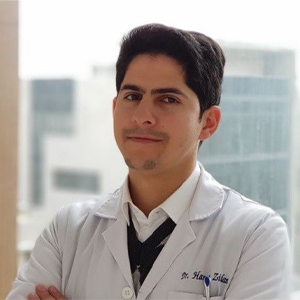PErioperative Echocardiography & UltRaSound (PEERS)

Program Director: Dr. Hamza Zidan
PErioperative Echocardiography & UltRaSonography (PEERS) refers to utilization of Transesophageal Echocardiography (TEE), Transthoracic Echocardiography (TTE) or Point Of Care Ultrasound (POCUS) during the perioperative period in the management of patients undergoing non-cardiac surgery. The PEERS program focuses on perioperative hemodynamic management in high-risk surgical procedures or high-risk patient undergoing non-cardiac surgery. The program provides the necessary support to perform POCUS exams at the pre-anesthetic clinic, intraoperative TTE or TEE for hemodynamic management on an elective or rescue basis and post-operatively as indicated.
The PEERS program is novel and it is anticipated to have a rapidly expanding role in the perioperative management of high-risk procedures and high-risk patients undergoing non-cardiac surgery. One of the major obstacles is the lack of training opportunity on this technology in the perioperative setting. The Department of Anesthesia & Perioperative Medicine at Western University is pleased to offer the PEERS fellowship training program, which offers a wide range of clinical experience in perioperative echocardiography and ultrasound applications.
The PEERS fellow is responsible to examine the indications for echo/US, to prepare the echocardiography machine, to perform the echocardiography examination under supervision of the program director, to store images and to produce a report for each study. The image quality and the interpretation of the findings will be discussed with the fellow during performance.
Duration
12 Months
Goals and Objectives
The aim of the program is to produce qualified echocardiographers with main interest in utilizing echocardiography in non-cardiac surgery for optimal patient's management with the following objectives:
- Gain cognitive and technical skills in advanced perioperative echocardiography and POCUS.
- Develop proficiency in the performing qualitative echocardiographic assessment of the hemodynamics.
- Gain expertise in the performance and interpretation of echocardiographic findings.
- Develop expertise in mastering hemodynamic management in high-risk patients and in patients presenting for high risk surgery
- Understand the indications, contraindications, clinical applications and quality assurance of the perioperative hemodynamic echocardiography.
- Ability to perform quantitative echocardiographic exams at different settings (pre-op, intra-op and post-op) with the specific goal of attaining the National Board of Echocardiography's Certification in Perioperative echocardiography at completion of fellowship training.
- Provide leadership in perioperative echocardiography.
Assessment
There are periodic formal evaluations of the fellow's progress at the end of each rotation. Each fellow keeps a log of all cases performed and reviewed during his/her training to assess the fellow' exposure and knowledge. The number of TEE exams will be used toward the NBE Certification. The fellow is expected to be actively involved in a research project with a national presentation at the Canadian Society of Anesthesiology Annual meeting.
Fellowship Structure
- Duration: The Fellowship comprises 12 months of hands-on training, which provides the fellow with adequate time to rotate through various echocardiography/US rotations. The fellow is expected to spend 3 days per week in the specialty and 2 days working independently in the non-cardiac operating rooms.
- Rotations: The Fellowship consists of the following rotations: Non-cardiac ORs (Main rotation); Cardiac ORs (one block); Pre Anesthesia Clinic; Post Anesthetic care Unit (PACU)
Research and Education
This invovles:
- Echo/US rounds to discuss different topics
- Echo/US rounds to discuss interesting cases and management
- Cardiac hemodynamic measurement and Calculations
- Review of different cases to ensure an adequate number that required by NBE.
Echo rounds will be conducted on weekly basis and it is the fellow’s responsibility, in consultation with the program director, to choose the topic and cases for presentation.
Eligibility Requirements for Canadian and Foreign Medical Graduates
- Candidates must possess a medical degree from a University recognized by the Medical Council of Canada (MCC)
- Candidates must have completed an anesthesia residency that is recognized by the College of Physicians and Surgeons of Ontario (CPSO)
- International Medical Graduates do not need to write additional exams, but must be approved by the PGE Office at Western University
- English Language Requirement for IMGs: TOEFL-iBT required to achieve an overall score of no less than 93 with a minimum score of 24 in speaking; IELTS required to achieve a minimum score of 7 in each category.
- All non-Canadian trained anesthesiologists will be required to pass an assessment period taking place over the first 4 - 8 weeks in order to continue with the fellowship (‘PEAP’ – Pre-entry assessment period).
- Please refer to the Application and Requirements page for a more detailed description
Application & Requirements | Fellowships Offered | Resources








